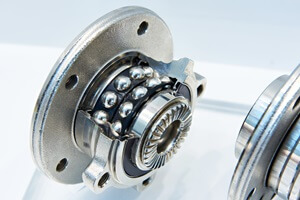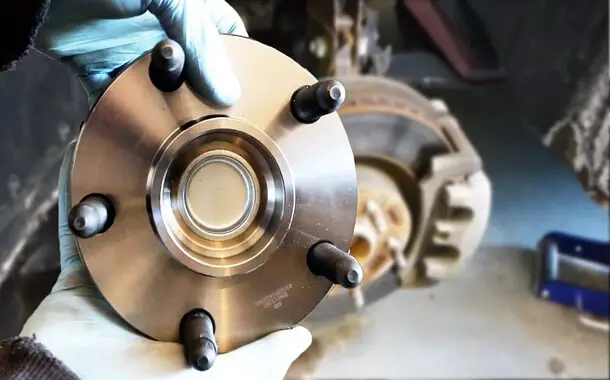How Much Does it Cost to Replace a Wheel Bearing?
Last Updated on December 29, 2023
Written by CPA Alec Pow | Content Reviewed by ![]() CFA Alexander Popinker
CFA Alexander Popinker
Wheel bearings are small yet critical components enabling vehicle wheels to spin freely. Sealed inside sturdy metal housings, these steel ball bearings provide low-friction rotation for wheels to turn smoothly. However, constant pounding over bumpy roads eventually wears bearings out. Replacing them before failures strand you roadside proves vital.
But how much does replacing worn wheel bearings cost anyway? This article breaks down bearing replacement parts and labor pricing across vehicles, factors shaping costs, additional charges, money-saving tips, and recommendations. Whether you feel roughness when cornering, hear faint rumbling noises accelerating, or simply want preventative upkeep, use this pricing insight to budget for essential wheel bearing maintenance.
How Much Does it Cost to Replace a Wheel Bearing?
Wheel bearing replacement costs range widely from $150-$700+ across cars and light trucks depending on factors like the make and model of your car, the price of the parts themselves, labor time, your location, and the mechanic you’re working with.
So replacing two worn bearings using quality aftermarket parts and expert mechanics likely costs around $750 for most light trucks and SUVs when adding around $400 in parts plus three hours of labor ($120 hourly regional average). Compacts fall closer to $450 using less expensive bearing sets.
Luxury and performance often link wheel bearings to costlier suspension components or use complicated housing units only dealers can acquire, raising prices towards $700+. Know your year, make, and model when first asking for quotes.
AutoZone notes that the cost of a wheel bearing replacement varies depending on the type of bearing and the vehicle. For traditional cone or roller bearings in older 2WD vehicles, the cost is around $6-20 per unit and $80-100 per hour, including replacing the rotor. For complete-unit hub bearings in most modern vehicles, the cost of the bearing is usually between $80 and $300. Labor for removing and pressing in a new bearing ranges from 1 to 4 hours and costs between $80 and $200 per hour.
A Reddit user reported that their wheel bearing replacement cost $700 for parts and $300 for labor, totaling $1,000. However, this price may not be representative of the overall cost for wheel bearing replacements, as individual experiences can vary.
You might also like our articles on the cost to replace control arm bushings, service AWD, or install coilovers.
According to Kelley Blue Book, the national average cost for fixing wheel bearings at one wheel is about $350. However, the cost can vary depending on the make and model of the vehicle, as well as the garage’s labor rate and the cost of parts.
RepairSmith states that a wheel bearing replacement could cost between $150 to $800, depending on the make and model of the vehicle, part price, and labor charges in the area. The cost of a wheel bearing averages between $50 to $120, while a new wheel hub could cost between $200 and $500. Labor charges for a wheel bearing replacement can range between $60 to $300, and changing the wheel bearing usually takes around 1 to 1.5 hours.
J.D. Power The cost of replacing wheel bearings varies based on several factors, including the vehicle’s make, model, type of bearing, cost of parts, and labor.
Breaking Down Wheel Bearing Repair Costs
Your total damaged wheel bearing replacement bill combines three elements:
- Parts – The wheel bearings, races, seals, and hardware like bolts constitute material expenses. Aftermarket brands range widely here from $20 economy bearings to $300+ per ceramic bearing used in performance applications. Sets average $200 per axle but cost five times more for select luxury automakers.
- Labor – Expect to pay shop hourly rates spanning $70 for small independents up to $150 at high-end dealers in metro areas. Larger trucks require removing wheels/brakes to access bearings, taking up to 8 hours roundtrip. Compacts need only 2 hours by comparison.
- Location – Major metro shop rates exceed small towns by $20-$50 hourly.
- Miscellaneous Shop Charges – Disposal fees, shop supplies, tax, and hazardous waste charges may be 10-20%.
Variables influencing a bearing job’s total price also include the extent of any collateral damage uncovered once work begins. Wheel speed sensors, CV joints, or damaged knuckles quickly add to costs. But assuming a straightforward bearing replacement using aftermarket components, you can expect $250-$500 for most vehicles.
Replacement Parts Cost Breakdown
Even quality aftermarket wheel bearing kits keep costs reasonable compared to complex suspension repairs. Here’s a breakdown of typical replacement components and pricing:
- Wheel Bearings: These precision inner/outer bearings enabling smooth wheel rotation start around $25 each in economy grades and up to $85 apiece for premium ceramic bearings extending longevity. Consider at least $140 per axle for quality parts.
- Bearing Races: Hardened steel races provide bearing roll surfaces and run $20-$75 each. Budget $60 per race.
- Seals: Rubber seals prevent lubricant leaks and environmental grime, costing $5-$15 per seal.
- Retainers/Hardware: Snap rings, washers, bolts, and nuts account for a few dollars. But missing fasteners delay jobs.
- Wheel Hub Assemblies: For more integrated hub and bearing assemblies, budget $200+ for factory-level all-in-one wheel bearing hub units.
With various configurations across makes/models, you should specifically about your vehicle’s replacement parts package and associated pricing.
Additional Repair Cost Factors
Multiple variables beyond parts/labor influence per-vehicle price ranges like:
- Vehicle Type: Heavier light trucks already require pricier brakes/tires/suspension components compared to economy compact commuters.
- Make & Age: Luxury and performance vehicles often use proprietary components only available through dealerships at premium rates. Older cars use less common bearings sometimes requiring adaptation.
- Severity of Damage: If worn bearings chew up surrounding metal components like sensors, knuckles, or axles, add several hundred dollars more for collateral repairs. Catch issues early!
- Technician Experience: Some garages employ newer assistants-in-training who take additional time compared to 30-year veteran experts earning premium pay.
Noises, resistance turning, and even vehicle pulling suggest potentially ruined bearings requiring urgent replacement to avoid damaging other components. Identify symptoms early and quote repair costs to earmark funds.
Committing to regular service checks allows budgeting major repairs in advance versus road-stop failures resulting in stressful rushed decisions and inflated towing/rental/parts fees.
Additional Repair Costs Beyond The Basic Job
On top of mechanical components and technician hours, additional charges may apply:
- Towing Fees – Expect $50+ for tow trucks to haul immobilized vehicles to garages if failures happen offsite. Factor greater distances at around $5 per mile depending on the region.
- Diagnostic Assessments – Technicians may bill around $125 hourly to pinpoint if noises stem from bearings versus other issues before quoting service. Knowing this helps determine most economical fixes accurately.
- Rental Cars/Transportation – Major jobs spanning days because of challenging parts sourcing or collateral damage repairs might necessitate $30-$50 daily rentals if no backup vehicle exists.
- Tire Replacement – Worn bearings grind away expensive tires prematurely. New rubber adds $500+ per axle easily. Catch bearings early!
While technicians quote jobs assuming ideal conditions, take initiative requesting they call for quotes exceeding 20% over initial estimates if difficulties arise requiring more time or machine work. This avoids major budget overruns from uncontrolled spray-and-pray fixing.
Strategies For More Affordable Wheel Bearing Replacement
 If staring down a $700 dealer quote leaves you despairing alternatives exist! Here are some tips to reduce back or front wheel bearing replacement costs:
If staring down a $700 dealer quote leaves you despairing alternatives exist! Here are some tips to reduce back or front wheel bearing replacement costs:
- Call multiple trusted independent shops requesting their best rates. Quotes spanning hundreds of dollars happen routinely.
- Purchase economy bearings online yourself at around $60-$80 per pair to lower quotes. Invest in premium parts only if longevity is important for you.
- Learn to diagnose distinct rumbling bearing noises early and replace them before catastrophic failures make collateral repairs necessary.
- Consider DIY replacement if you own jack stands, wrenches, and a torque wrench. Sweat equity slashes overall costs, albeit at the expense of knuckle skin and swearing. Know your limits!
Stay proactive in performing test spins checking for resistance when wheels point toward the sky, indicating worn bearings. Consistent maintenance and rapid response to early warning signs makes bearing replacement affordable – before hotels, tow trucks, tire replacements, and major mechanical damage enter equations – blowing budgets.
Final words
Replacing bad wheel bearings costs approximately $300-$500 on average across most passenger vehicles when using quality aftermarket component kits and experienced professional technicians charging around $100 hourly shop rates. But prices range from $150 for basic economy compact jobs up past $700 for luxury or performance cars using exclusive dealership parts.
Some factors determining overall pricing include local labor rates, make/model-specific part configurations, and the number of bearings requiring simultaneous replacement, as many SUVs, crossovers, and trucks require swapping both left and right wheel bearings in tandem.
Additional charges also apply if collateral damages occur to knuckles, sensors, or suspension components due to loose bearing fragments grinding metal surfaces.
While the parts making up wheel bearing kits remain relatively inexpensive compared to machine work or electronics repairs, understanding total replacement costs proves vital for budgeting inevitable wear-and-tear maintenance as cars age past 60,000-80,000 miles.
Combining quality aftermarket components with experienced technicians’ expertise keeps vehicles rolling smoothly, safely, and affordably.


Leave a Reply
Want to join the discussion?Feel free to contribute!